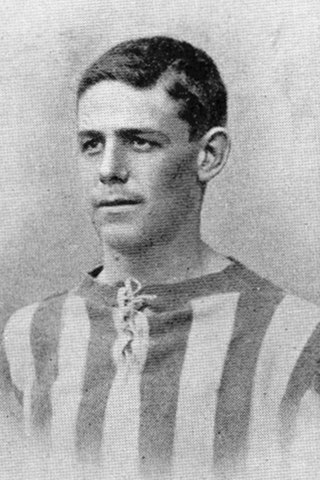John Gilbert Cock MM MID was an English footballer who played for various English club sides as a centre forward. He also had the distinction of being the first Cornishman to play for the England national team, a decorated World War I soldier, and an actor. His younger brothers, Donald Cock and Herbert Cock, also played professional football.

Alexander Graham was a Scottish professional football half back, best remembered for his time with in the Football League with Arsenal either side of the First World War.
David McCulloch was a Scottish footballer who played for several Scottish and English clubs in the 1930s, most notably Heart of Midlothian, Brentford and Derby County. He also represented Scotland at full international level.
William Charles Gorman was an Irish footballer who played for, among others, Bury and Brentford. Gorman was a dual internationalist who also played for both Ireland teams – the FAI XI and the IFA XI. In September 1946 Gorman, along with Johnny Carey, actually played for both teams against England within three days of each other. The 11 international caps Gorman won while playing for Bury remain a club record.
Charles Richard McEleny was an Irish professional footballer who mostly played as a centre half.
Malcolm MacDonald was a Scottish professional footballer and manager, best remembered for his time as a utility player with Celtic and as a manager with Kilmarnock and Brentford. MacDonald managed the Scotland national team on a caretaker basis in 1966. He is a member of the Brentford Hall of Fame.
Peter Stewart McKennan was a Scottish professional footballer who played as an inside forward in the Scottish and English leagues, most notably for Partick Thistle, for whom he scored 113 goals in 198 appearances in all competitions. McKennan represented the Scottish and Irish League representative teams and is a member of the Partick Thistle Hall of Fame. He was nicknamed "Ma Ba", due to his desire to receive the ball into feet and dictate play.
Joseph Crozier was a Scottish professional footballer who made 200 appearances in the Football League for Brentford as a goalkeeper. Crozier has been described as Brentford's best-ever goalkeeper and he is a member of the club's Hall of Fame. He represented Scotland in wartime international matches.

Alexander Stevenson was a Scottish professional footballer who made over 120 Football League appearances as a right back for Brentford. He also played in the United States and Northern Ireland.
Duncan McKenzie was a Scottish professional footballer who made over 150 appearances in the Football League for Brentford as a right half. He was capped by Scotland at international level.

Lawrence Bell, sometimes known as Laurie Bell or Lawrie Bell, was a Scottish professional footballer who played as a centre forward and outside right. He is most notable for his time in the Football League with The Wednesday and Bolton Wanderers. He represented the Scottish League XI.
Christopher ColumbaFletcher is an Irish retired professional footballer who played as a forward in the Scottish League for Kilmarnock and Morton. He also played in the Football League for Brentford.

Patrick Hagan was a Scottish professional footballer of Irish descent who played as a forward in the Scottish League for Hibernian and Port Glasgow Athletic. He won five pieces of silverware with Irish League club Linfield between 1903 and 1904.
During the 1938–39 English football season, Brentford competed in the Football League First Division. A six-match unbeaten run in February and March 1939 pulled the club clear of a near-certain relegation.
During the 1945–46 English football season, Brentford competed in the Football League South, due to the cessation of competitive league football for one further season following the end of the Second World War in Europe in May 1945. A return to competitive cup football came in the form of the first FA Cup staged since before the war, with the Bees advancing to the sixth round and equalling the club record.
During the 1939–40 English football season, Brentford competed in the Football League, playing three matches before competitive football was suspended due to the outbreak of the Second World War. The club played in three unofficial wartime competitions for the remainder of the season – groups B and C of the Football League South and the Football League War Cup.
During the 1940–41 English football season, Brentford competed in the Football League South, due to the cessation of competitive football for the duration of the Second World War. Though the Bees finished well down in the league placings, the club enjoyed some measure of success in the London War Cup, finishing as runners-up to Reading.
During the 1918–19 English football season, Brentford competed in the London Combination, due to the cessation of competitive football for the duration of the First World War. Buoyed by larger crowds after the Armistice, Brentford finished the season as champions of the London Combination.
During the 1915–16 English football season, Brentford competed in the London Combination. In the first season of non-competitive wartime football during the First World War, the Bees finished in mid-table in each of the leagues run by the London Combination.





